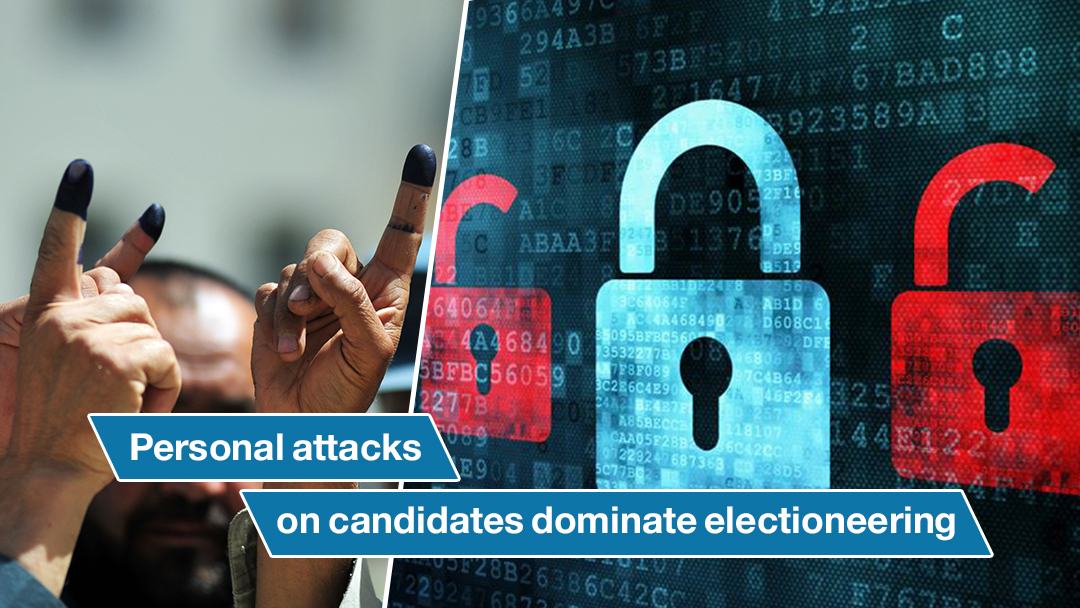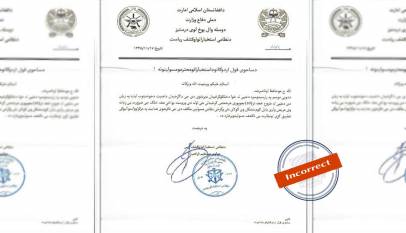Personal attacks on candidates dominate electioneering
KABUL (Pajhwok): Parties engaged in the presidential election process say their personal lives were attacked and their privacy violated by a number of candidates, media and social media users, demanding prevention of the norm.
The privacy of a person is information regarding his or her personal life and its protection is a principle in societies particularly in developed societies. Respecting privacy is a social moral and violating it can damage people mentally, financially and physically. Even laws and courts cannot violate people’s privacy without valid reasons.
Presidential election electioneering started on July 28 and would continue until September 26, two days ahead of the voting.
‘Dressing style, ‘Makeup’, ‘President Ashraf Ghani’s wife did not suffer the pain of childbirth in Afghanistan’, ‘Divorce to wife’, ‘Falling in love with a student and then marrying her’ and some other words are circulating on media and candidates also mentioned them during their campaigns.
Rule of law and procedures about privacy violations:
According to Article 628 of the penalty code about exposing family secrets says, “If a person exposed secrets of a family, the person would be fined from 10,000 to 30,000 Afghanis even if the secrets are real.”
The article four of mass media bill about privacy in elections say that the mass media should respect the privacy of people and do not interfere in people’s personal lives.
The article seven of the mass media bill about election violations says that publishing topics that insult the personal life of election candidates and other people is a violation. The offender is fined from 5,000 to 100,000 Afghanis.
Electoral tickets criticize violation of candidates’ privacy
Ahmad Ehsan Sarwaryar, spokesman of a presidential candidate, Faramarz Tamanna, criticized personal attacks from some media outlets and social media users against candidates and called it regrettable and violation of the law.
He said people’s privacy should be protected based on the country’s laws and media outlets had to show neutrality regarding candidates.
Concerned about violation of privacy of Tamanna’s ticket leadership, Sarwaryar said, “We have not yet lodged a complaint but this is a matter of concern for us because some media outlets are trying to discuss things that do not relate to elections and politics.”
This comes after Arzo Nuristani, wife of Faramarz Tamanna in a TV program and Mariam Seddiqa Sadat, a member of Ashraf Ghani’s ticket, engaged in discussions pertaining candidates’ personal life.
Arzo Nuristani talking to Sadat in the program, said, “Those who did not experience the pain of childbirth in Afghanistan cannot be an Afghan woman. The first lady (Rula Ghani) is not the first lady, as when a person becomes the first lady as a result of a deal, then it is a different topic,.”
Mariam Seddiqa Sadat in response to Arzo said that Tamanna fell in love with his student and then married her and betrayed one of the strong Afghan women (Humaira Qaderi) and separated her from her child for three years.
Opinions of election oversight institutes
Yousuf Rashid, head of Free and Fair Election Foundation of Afghanistan (FFEFA) said that desecration, violating privacy of people, echoing personal issues in public during electioneering was not a right thing.
“We watched most of electoral tickets instead of explaining their future programs talked about things which did not represent the nation of Afghanistan. It is regrettable because supporters of these tickets get negative ideas from such statements,” he said.
He criticized representatives of electoral tickets for attacking each other’s privacy and said that the spokespersons of tickets blathered on during their speeches.
About TV talks shows with candidates, he said, “Some of these talks turned hostile even beyond the control of the host.”
Legal experts’ opinions
Shahla Farid, a law and political science lecturer in Kabul University, said that people’s privacy was not explained in the country’s laws and the penalty code only mentioned it.
She said there was no court to address cases of privacy violations. She criticized presidential candidates for attacking each other’s personal life and said, “Our social morals do not allow us to question one’s privacy on media.”
She said many people were still undecided in choosing a candidate because the presidential hopefuls were yet to clearly explain their programs to the public.
“People had been expecting that candidates would review each other’s programs and explain their own plans, but unfortunately the president, the chief executive and other candidates attacked each other’s personality and even question the dressing styles of their rivals which is against the rules of election campaigns,” Farid said.
Independent Election Commission (IEC) view:
Benafsha Benesh, secretary and a member of the media committee of the IEC, said that privacy of people, particularly candidates, was protected based on the country’s constitution.
About the article four of mass media bill for election coverage, she said that mass media had no right to attack people’s personality and talk about their personal life based on the bill.
“If a media outlet or journalist asks a question related to a person’s private life from the interviewee, it is a clear violation of the article four of the mass media bill for election coverage.”
“Whenever a media outlet violates the privacy of a person or engages in discussions related to personal life of people or insults them and the committee receives complaint in this regard, it would first deliver in written warning to the media outlet, and if repeated, the media outlet would be fined from 5,000 Afghanis to 100,000 Afghanis”, she said.
She said that media outlets that violated people’s privacy again and again would be introduced to judiciary organs.
Benesh said that no complaints regarding privacy violations had so far been lodged with the committee but media outlets that violated the bills and procedures had been warned.
Independent Electoral Complaints Commission (IECC) view:
Mohammad Qasim Elyasi, secretary and spokesman of IECC, regretted that people’s privacy had no mention in the electoral law and said, “This word is used to damage another candidate or we can say it can damage the privacy.”
He said no negative competitions should be held as election campaigns and the IECC would respond to any type of insults and damaging other’s reputations during election. Elyasi said no complaints had been received by the commission about privacy violations.
Azizullah hamdard
Hits: 7970
Letter regarding ban on roaming during night is fake
KABUL (Pajhwok): The Ministry of Defence (MoD) and an expert have rejected the letter rega…



